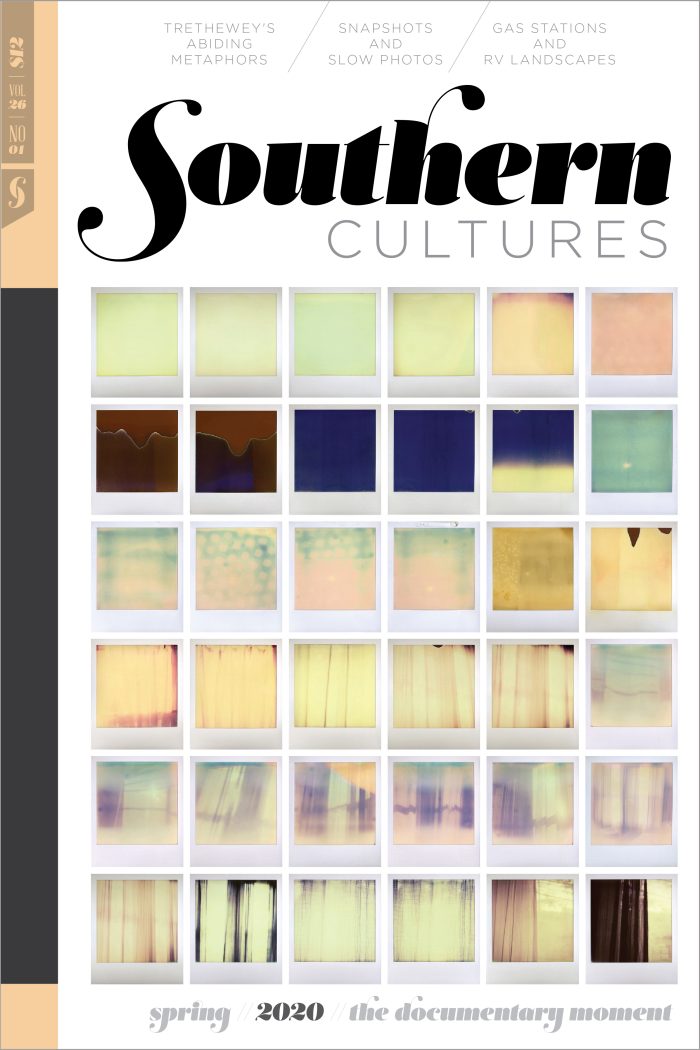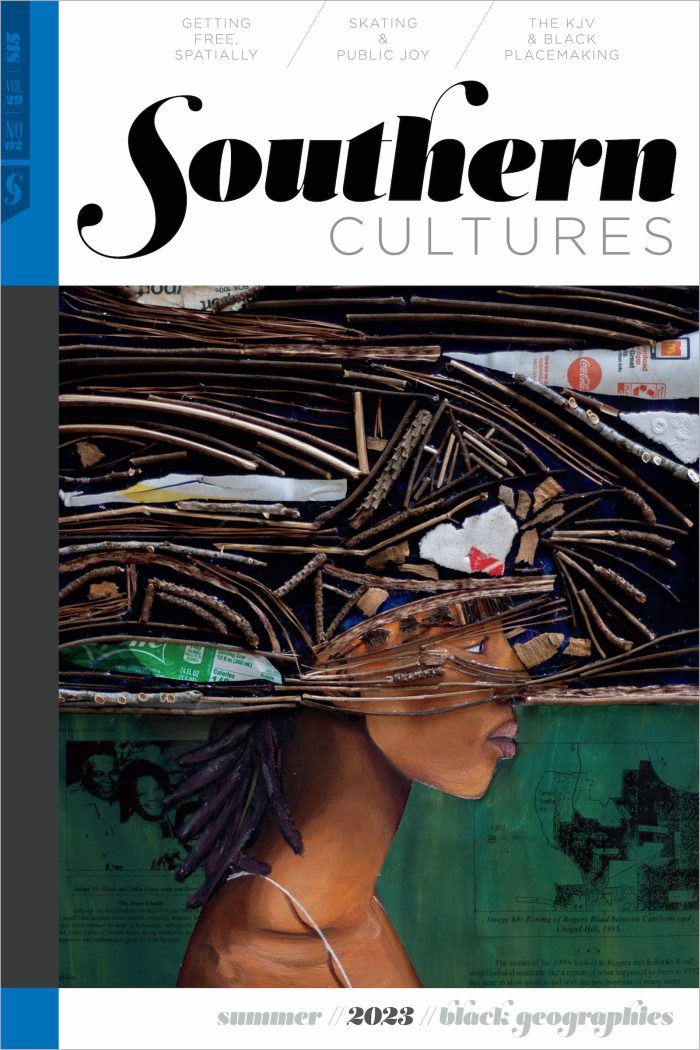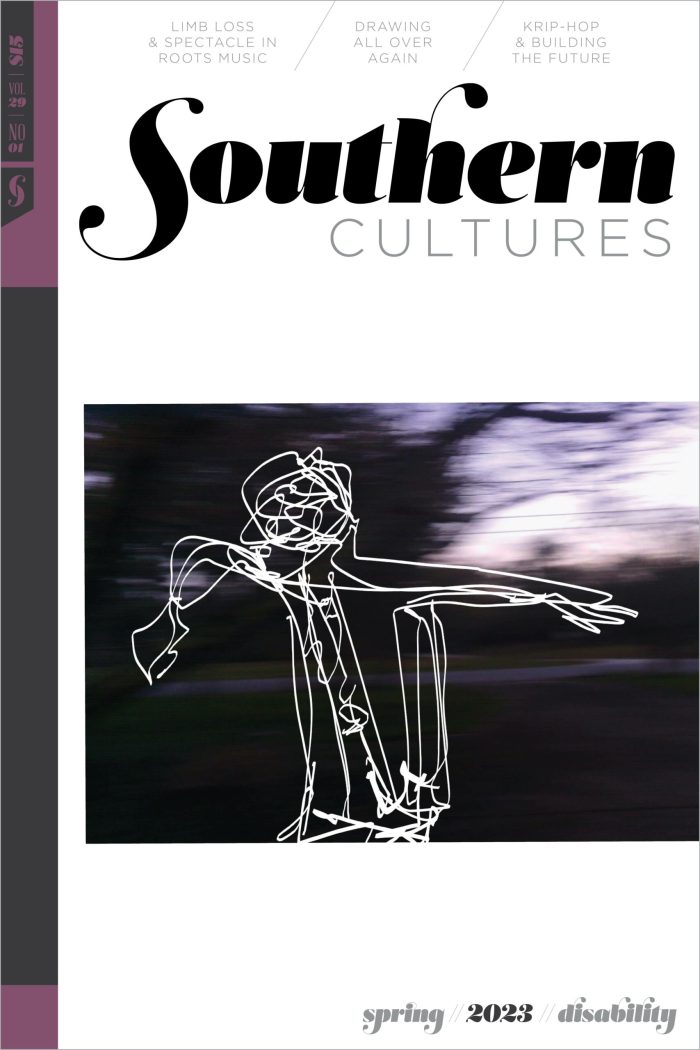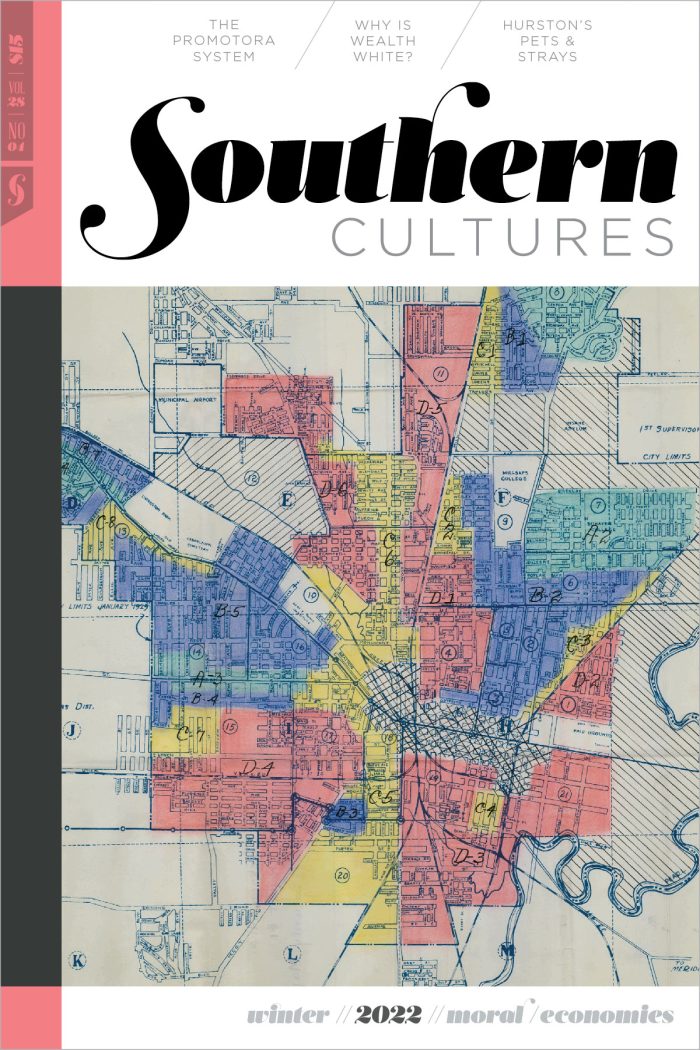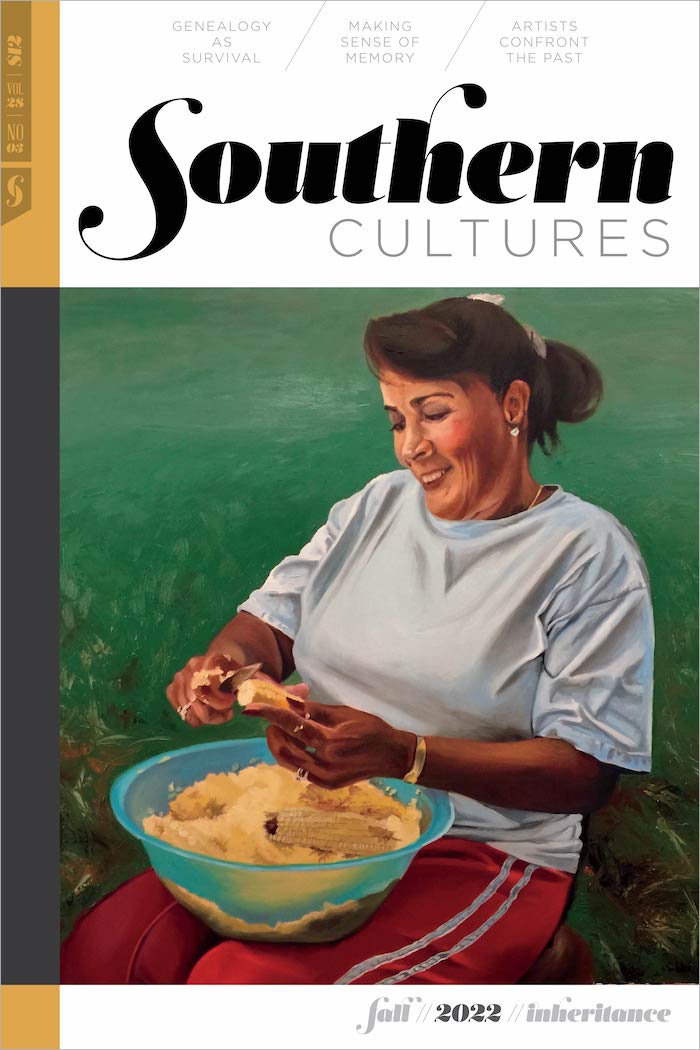Essay
BUY ACCESS
by Harry Watson
“People want to study [the South’s] differences and continuities, its joys, tragedies, and outrages, to affirm the significance of place in a world of displacement.” This issue carries Southern Cultures through its twenty-fifth year and past our four anniversary issues: Backward/Forward, Inside/Outside, Left/Right, and Here/Away. We hope our readers have enjoyed these special numbers as »
Essay
BUY ACCESS
by Tom Rankin
“The documentary artist attempts, however imperfectly, to do something about what they witness, how they feel, what they are compelled to say.” For many years I’ve forbidden students in my photography courses from coming to class and talking about an image they saw but didn’t take. In a class built around the making of pictures, »
Memoir
On Abiding Metaphors and Finding a Calling
by Natasha Trethewey
1. Abiding Metaphors When I was three years old, I nearly drowned in a hotel pool in Mexico. My earliest memory is of what seemed a long moment, as if I were suspended there, looking up through a ceiling of water, the high sun barely visible overhead. I do not recall being afraid as I »
Photo Essay
by Tamika Galanis
“The ruins remain overgrown with castor plants, which can be, alternately, an excellent source of sustenance if cooked properly or a natural source of cyanide.” The traditional Bahamian response to the request for someone’s name, upon introduction, is typically their name preceded by “I name.” Such a title seemed fitting for this project after I »
Photo Essay
by Kate Medley
From the Documentary Moment Issue, Kate Medley’s “Gas Station South” has us thinking about communal experiences—especially in this moment of isolation. Who do we miss bumping elbows with when we are encouraged not to go out? What role in our lives does this type of community interaction play? Also, what counts as essential? Ask anyone »
Essay
BUY ACCESS
Creating Dangerously in The Land Where the Blues Began
by Tyler DeWayne Moore
Creating Dangerously in The Land Where the Blues Began “Worth Long’s lifelong quest to preserve the creativity of those who sang, hollered, prayed, played, and lived the blues, dangerously, was one of his greatest contributions as an activist.” In the fall of 1967, folk music columnist Israel “Izzy” Young expressed his enthusiasm for the emergence »
Snapshot
BUY ACCESS
by Phyllis B. Dooney
“Photographers and collectors work from cousin impulses.” Documentary is kindred to collecting. Photographers and collectors work from cousin impulses. As a young girl, I went on a family vacation to Arizona. We did a “gold mining” tourist expedition and with untanned skin scooped our strainers in the streams. I noticed a rock in the water, »
Snapshot
BUY ACCESS
by Lynn Marshall Linnemeier
“I left fifty years ago. Why would I want to come back?” I am back in North Carolina, remembering when I was back in North Carolina and dreamed of coming home. After running away from my hometown for most of my life, I can’t believe I dream of going home every day. My family abandoned »
Photo Essay
BUY ACCESS
New Orleans Second Line Parades
by Pableaux Johnson
New Orleans Second Line Parades “Sunday Second Lines nod to the past but embrace the present, dancing along that thin line where tradition thrives, four hours of unbridled jubilation at a time.” On roughly forty Sundays a year, the hardworking members of New Orleans Social Aid and Pleasure Clubs take turns celebrating the everyday joy »
Photo Essay
by Joanna Welborn
“There’s an unsettledness that attracted me to these spaces, that maybe draws in people of a wandering sort, but it doesn’t allow for getting too attached.” From 2005 to 2007, I used a Rolleicord twin lens reflex to photograph RV parks across North Carolina, making color landscapes and portraits to document a vanishing world. I »
Snapshot
BUY ACCESS
by Rachel Jessen
“All you can see is a moment when the late afternoon light shone down on some old stone and prairie grass. A frame made from a town’s future in the past.” The photographic form can really only tell us one thing: what was there, once. This photograph was taken on a muggy June day in »
Snapshot
BUY ACCESS
by Jeremy M. Lange
“We watch the evidence of a hard day’s labor evaporate into the deepening night sky.” We are banging down the highway in the rental car, Derek and I, leaving Arkansas, heading to New Orleans, but we’ve left time to wander in Mississippi. No real place to go, but looking for nothing in particular, follow your »
Essay
Black Women and Resilient Creativity in the Rural South
by Kimber Thomas
“These women were engaged in an ongoing, material experiment of how to be together and live together in their world, at the Crossroads.” Mamie Barnes was the first Black woman to own land at the Crossroads. Her lot was right below the four-way stop, down the fork and to the left, directly in the sun, »
Snapshot
BUY ACCESS
by Eliot Dudik
“And just as I was starting to get frustrated that a picture wasn’t to be found here, I spotted Emanuel and his son Yeddeh in the shaded opening of their garage, engaged in a most intimate and trusting family ritual.” This little neighborhood in Baytown, Texas, sandwiched between I-10 and the Lynch-burg Canal on the »
Snapshot
BUY ACCESS
by Rox Campbell
“From where I stood, I saw the spirit their bodies had conjured: that was the moment I wanted.” We were in a crowded church. I couldn’t see much until I let the crying, stomping, and chanting guide me. As the believers rocked side to side, their skirts and robes blended with the powerful sounds filling »
Photo Essay
by Holly Lynton
“We were not so much learning how to photograph as how to see.” I often describe my undergraduate photography training at Yale University as a photo boot camp. On the first day of class, we were told to acquire a 35 mm camera—ideally one that did not require a battery—with a 50 mm lens. Zoom »
Snapshot
BUY ACCESS
by Jon-Sesrie Goff
“What I appreciate most in this document are my grandmother’s inked corrections of the misspelled name of the family who enslaved ours.” My grandmother was a secret archivist. When we cleaned out her home after she died, we found neatly organized records of her life. Among stacks of newspaper articles of nearly every milestone in »
Film
BUY ACCESS
by Elaine McMillion Sheldon
“I have skin in the game. I live here. Appalachians hold me accountable at the grocery store, and that makes the work, and me, more honest.” The week of March 13, 2017, was like any other week for me. I was hustling to get access to a tense courtroom for my feature documentary Recovery Boys »
Snapshot
BUY ACCESS
by Aaron Canipe
“It’s another muggy southern summer and the landscape is overgrown with signs and symbols following in its oxygen. How much hill can a person bear?” The thing about moments for me is that they’re never about one thing. Frustratingly, photography carries a singular moment in time but must bear the weight, too—of context, truth, and »
Snapshot
BUY ACCESS
by Jared Ragland
“As blood filled the syringe and tears began to fall down her cheeks, Willow’s mood shifted from excitement to determination, frustration to embarrassment.” Between 2015 and 2017, I partnered with University of Alabama at Birmingham sociology professor Heith Copes to create an ethnography of methamphetamine use in rural Northeast Alabama. Together, we interviewed and photographed »
Poetry
BUY ACCESS
by Alan Shapiro
If in the crinkling thin as air metallicblankets there are flashes signaling backand forth over the little bodies wrappedinside them sleeping on cage floor, gym floor, floor of a defunct warehouse, don’t think of torchfires, beacons of distress, or in the softnessany sign of soothing though they’re softas tissue, even softer yet untearable, a just »
Photo Essay
by Zoe van Buren,
Katy Clune
“The following portraits show a few of the new faces of tradition in North Carolina, revealing the range of who they are, what they do, and how they commit to their artistic practice.” Since 1977, the Folklife Program of the North Carolina Arts Council has identified and documented traditional artists and their communities in order »
